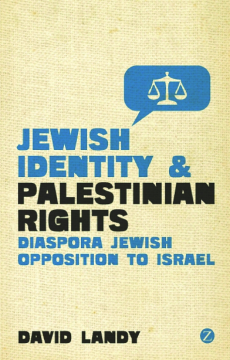
Additional Information
Book Details
Abstract
Diaspora Jews are increasingly likely to criticise Israel and support Palestinian rights. In the USA, Europe and elsewhere, Jewish organisations have sprung up to oppose Israel’s treatment of Palestinians, facing harsh criticism from fellow Jews for their actions.
Why and how has this movement come about? What does it mean for Palestinians and for diaspora Jews? Jewish Identity and Palestinian Rights is a groundbreaking study of this vital and growing worldwide social movement, examining in depth how it challenges traditional diasporic Jewish representations of itself. It looks at why people join this movement and how they relate to the Palestinians and their struggle, asking searching questions about transnational solidarity movements.
This book makes an important contribution to Israel/Palestine and Jewish studies and responds to urgent questions in social movement theory.
'At last, we have an authoritative and incisive analysis that has to be an essential item of any reading list on Palestine and Israel in the future.'
Ilan Pappe, Director of the European Centre for Palestine Studies
'David Landy's intriguing book strives to de-colonize Jewish thinking itself, transcending the deeply troubling Judeo-centric approaches to Palestine that often entrap it.'
Omar Barghouti, human rights activist, author of 'Boycott, Divestment, Sanctions (BDS): The Global Struggle for Palestinian Rights'.
'A must read for those on either side of the Boycott, Divestment and Sanctions movement as well as those engaged in navigating the future of Jews, Israel and Palestinians.'
Marc H. Ellis, Director of the Center for Jewish Studies, Baylor University, Texas
David Landy is currently based at Lancaster University, where he teaches contemporary social and cultural theory, and race and migration.
Table of Contents
| Section Title | Page | Action | Price |
|---|---|---|---|
| About the Author | ii | ||
| Contents | v | ||
| Acknowledgements | vi | ||
| Introduction | 1 | ||
| Movement description | 4 | ||
| Researching the movement | 12 | ||
| Book plan | 16 | ||
| 1 | Understanding and researching the social movement | 20 | ||
| Identity and distant issue movements | 23 | ||
| Bourdieu and social movements | 28 | ||
| Conclusion | 39 | ||
| 2 | The conflict over diaspora Jewish identity | 40 | ||
| Identity and diaspora | 42 | ||
| The attractions of exile | 46 | ||
| Rejecting Zionism, ignoring Palestinians | 55 | ||
| Conclusion: The limits of identity talk | 63 | ||
| 3 | The Jewish field and its dissidents | 65 | ||
| Rethinking ‘community’ | 66 | ||
| No longer ‘the club’: fragmented British Jewry | 72 | ||
| A history of the movement in Britain | 85 | ||
| Global Jewish opposition to Israel | 99 | ||
| 4 | Activists between the universal and the community | 120 | ||
| Coming out activist | 123 | ||
| Confronting Zionists: conversing with the Other | 129 | ||
| Cultivating the Jewish field | 139 | ||
| Conclusion: a global space for the community? | 148 | ||
| 5 | The terrain of activism | 151 | ||
| Boycott: ‘the middle-aged equivalent of wearing a Che Guevara t-shirt’ | 156 | ||
| ‘It’s kosher to boycott Israeli goods’ | 163 | ||
| Conclusion: rooted cosmopolitans | 176 | ||
| 6 | Rooted cosmopolitans: participants and Palestinians | 181 | ||
| Problems with Palestinians | 182 | ||
| Solidarity versus cosmopolitanism | 195 | ||
| Conclusion | 204 | ||
| Conclusion | 208 | ||
| How important is this movement? | 210 | ||
| Palestinian rights and Jewish identities | 215 | ||
| Notes | 219 | ||
| Introduction | 219 | ||
| Chapter 1 | 220 | ||
| Chapter 2 | 220 | ||
| Chapter 3 | 221 | ||
| Chapter 4 | 223 | ||
| Chapter 5 | 223 | ||
| Chapter 6 | 224 | ||
| References | 226 | ||
| Index | 243 |
